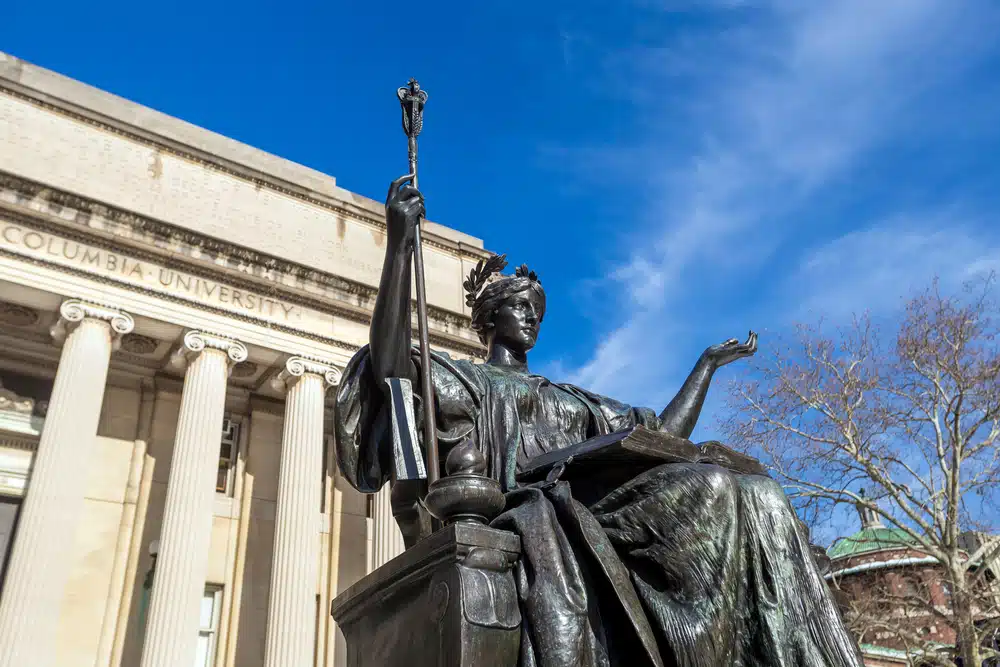Is Columbia Test Optional?
Is Columbia Test Optional? According to an announcement published on the Columbia Undergraduate Admissions website, the test-optional admissions policy that Columbia University has in place for applicants to Columbia College and Columbia Engineering has been extended through the Class of 2026.
This decision was reportedly made “in response to continued disruptions to standardized testing availability due to the COVID-19 pandemic,” as stated by the Office of Admissions. Because of the widespread cancellation of standardized tests like the SAT and ACT as a result of the COVID-19 pandemic, the University made the decision to implement a test-optional policy for first-year applicants during the admissions cycle for the academic year 2020-2021 in late May of 2020. The rationale behind this decision was the widespread cancellation of standardized tests.
Applicants whose plans to take the test had to be scrapped because of the pandemic will be able to submit their applications even if they do not have test scores. Applicants who already have test scores will have the option of submitting them, but it is strongly recommended that they do so. The revised policy was taken into effect on October 1.
Columbia University has announced that they will continue to accept self-reported scores and official scores upon enrollment, but that the university will be test-optional for an additional year in order to accommodate students who experienced difficulty during the COVID-19 pandemic. This decision was made in recognition of the fact that some students may not be able to take the test more than once.
The student’s grade point averages, their high school academic accomplishments, and the criteria for successful high school education will continue to serve as the primary indicators of student achievement even if they choose not to submit a test.
Transfer students attending Columbia will still be expected to provide their test scores, assuming they have taken any exams. Moreover, the university added that it will still act in accordance with the recommendations made by the Ivy League, but it has not yet decided what kinds of tests student-athletes are required to take.
What is the Current Columbia Acceptance Rate?
Columbia University received an almost identical number of applications, 60,377, to the record-breaking 60,551 applications received the previous year. The acceptance rate for Columbia University’s Class of 2026 was 3.73 percent, similar to the 3.66 percent rate from the previous year.
Although the numbers for the previous two years did not change, they were very different from the numbers for the 2019-2020 admissions cycle. In that cycle, there were only 40,083 students who applied, and 6.15 percent of them were admitted.
Only 2,253 students from all 50 states and 86 countries were selected to receive the coveted acceptance letter this year. To further expound on Columbia’s acceptance rate, the student body of Columbia University is also more diverse than it has ever been. The following students have been added to Columbia University’s Class of 2026 since last year:
- There was a 4% increase in the number of students who identified as students of color.
- An additional three percent of students whose families did not attend college
- 2 percent more Pell-grant-eligible students
- 2 percent more students coming from other countries
Acceptance Rates for the Columbia College Class of 2026
| Number of Applications | Accepted Students | Acceptance Rate | |
| Regular Applications | 54,072 | 1,603 | 2.96% |
| Early Applications | 6,305 | 650 | 10.31% |
The Regular Admissions Results for Columbia University for the Class of 2026
The number of applications for Columbia’s regular admissions program for the Class of 2025 came very close to matching its record-breaking total. In the regular decision process, the university was given a total of 54,072 applications but only accepted 1,603 students. In the regular admissions round, Columbia University, which is considered to be one of the most selective schools in the Ivy League, only accepted 2.96 percent of applicants.
Experts in admissions and the office of undergraduate admissions at Columbia both believe that the rise in applications over the past two years is most likely due to the institution’s test-optional policy, which has now been extended until 2024.
The Early Admissions Results for Columbia University for the Class of 2026
In December 2021, Columbia University released the results of its Early Admission process for the Class of 2026. This prestigious university revealed that 650 students had been granted early admission, putting the university’s overall acceptance rate at 10.31 percent. Whether Columbia is test optional or not, it is highly recommended that you submit your application to Columbia University as soon as possible to increase your chances of acceptance.
What are the Admission Requirements for Columbia University?
Every year, Columbia University receives applications from thousands of prospective students. However, admission is granted only to those candidates who have submitted applications of particularly high quality. Suppose you are the type of person who has always dreamed of attending a university. In that case, it is imperative that you are familiar with the acceptance rate at Columbia University as well as the requirements for admission to Columbia University.
Columbia University GPA requirements
The minimum grade point average required by Columbia is nothing more than a number that prevents your application from being immediately rejected after it has been submitted. Therefore, if you are serious about enrolling in college, you need to ensure that your grade point average is above the minimum requirement set by Columbia University.
Students are required to have a minimum score of 4.1 to meet the current requirements for the average GPA at Columbia. This indicates that you need to be one of the top students in your high school to be accepted to the university. In addition, you need to enroll in the most challenging Advanced Placement or International Baccalaureate classes that your high school has to offer.
Because they do not have enough time to improve their grades, it is difficult for all of the junior students who have low GPAs to meet the requirements for the average GPA required by Columbia. In this scenario, the applicants must prioritize raising their ACT and SAT scores to fulfill the prerequisites for admission to Columbia University.
Columbia University SAT requirements
Even though Columbia University does not specify a minimum SAT score requirement, the applicant’s score is still a significant consideration in the admissions process. Applicants who want to get into Columbia University should have SAT scores higher than the university’s average requirement to be considered.
It is estimated that a composite score of 1505 on the SAT will be necessary to meet the admission requirements at Columbia University. The SAT scale ranges from 200 to 2400. With numbers like these, the university is in a highly competitive position regarding SAT scores. In addition, prospective students whose SAT scores are lower than 1450 have a diminished likelihood of being accepted into the institution.
Columbia University ACT requirements
Your ACT score, in addition to your SAT score, is one of the most essential factors in determining whether or not you will be admitted to Columbia University. The university does not specify a minimum ACT score that applicants must submit an application; however, candidates whose scores are extremely low do not have a good chance of being accepted.
The current trends suggest that a score of 34 on the ACT is necessary to meet the requirements for admission to Columbia University. The applicants have a very high level of competition with this score. In addition, applicants who have an ACT score that is lower than 33 have a difficult time getting into the university of their choice to take the course that they want.
What are the Application Requirements for Columbia?
The admissions officer at Columbia examines each application in its entirety and with great care, intending to gain an understanding of what each applicant may bring to our undergraduate community. The purpose of Columbia’s application process is to select candidates who the university believes will benefit the most from the opportunity, both during their time at Columbia and for the rest of their lives.
Options for Applications
The Coalition Application or the Common Application may be submitted to Columbia University. Finalists in the QuestBridge competition will also have their QuestBridge applications considered. These applications consist of the following:
-
- Information based on one’s own autobiography
- Detailed lists and explanations of the student’s accomplishments, activities, and jobs, as well as his or her summer plans
- Personal essay
Questions Particular to the Application for Columbia
In addition to the Coalition App and the Common App, you must respond to Columbia-specific questions. These questions provide the Admissions Committee with a more comprehensive understanding of who you are as a person, including your academic, extracurricular, and intellectual interests.
These questions allow Columbia to comprehend better your intellectual curiosities, mental routines, passion for education, and sense of identity. These questions allow the Admissions Committee to learn more about you as a member of the community in which you currently reside and why you believe the distinctive experiences offered by Columbia University both inside and outside of the classroom would be a good fit for your undergraduate education.
Report from the Secondary School
-
- An official transcript from each and every high school that was attended during high school.
- The endorsement of one guidance counselor from a high school and a profile of the school
- The finished report for the half-year mark
Standardized Tests
For first-year applicants to Columbia College or Columbia Engineering in the fall of 2022, 2023, and 2024, having discussed more if Columbia is test-optional, Columbia will continue to follow their policy of not requiring standardized testing. On the other hand, you have the option of taking either the ACT or the SAT, and you are free to self-report your scores when you submit your application. In a typical year, we require applicants to submit the following information:
-
- The writing portion of the SAT or ACT is not required.
- Applicants are allowed to report their own scores on the application.
- Your score on the English Proficient Examination (if necessary)
Recommendations from Teachers
-
- These recommendations must come from instructors who have instructed you in relevant academic subjects.
- Applicants to engineering programs must provide a recommendation from an educator in either mathematics or science.
Application Fee or Waiver of Application Fees
To submit an application to Columbia University, a non-refundable application fee in the amount of $85 must be paid. Under no circumstances will we be able to reimburse the application fee that was paid. Unless otherwise specified, payment (or a fee waiver) is required when you submit your application.
If it will be a significant financial burden for your family to pay the application fee, Columbia strongly encourages you to request an automatic fee waiver through your admission application.
When is the Application Deadline for Columbia University?
Columbia University offers an early decision option for students, but not early action. The early decision process is binding, meaning if you are admitted, you must attend. On the other hand, early action would allow you to apply early without committing to attendance, but Columbia does not offer this.
The acceptance rate for early decision applicants at Columbia is 17 percent, whereas the overall acceptance rate stands at 6 percent. In the previous school year, Columbia admitted 726 out of the 4,318 early decision applicants.
Many high school students opt to submit their college applications early, believing it might increase their chances of acceptance. Applying before the early deadline demonstrates a keen interest in the institution and allows for an application review ahead of regular decision applicants, potentially enhancing acceptance odds.
Key Dates
November 1:
-
-
- Application deadline for Early Decision
- Application cutoff for the QuestBridge National College Match
-
November 15:
-
-
- Financial aid application deadline for Early Decision candidates
-
Mid-December:
-
-
- Admissions and financial aid decisions for Early Decision candidates are released online
-
January 1:
-
-
- Application deadline for Regular Decision
-
Early January:
-
-
- Response deadline for Early Decision acceptances
-
February 15:
-
-
- Financial aid application deadline for Regular Decision candidates
-
Early April:
-
-
- Admissions and financial aid decisions are available online for Regular Decision candidates
-
May 2:
-
-
- Response deadline for Regular Decision
-
May 15:
-
-
- Deadline for enrollment deferral requests
-
Late June:
-
-
- Final transcript submission deadline for incoming students.
-
If you need help putting the finishing touches on your early applications or want some advice on whether or not applying Early Decision or an Early Action is a good option for you, at AdmissionSight, we have over 10 years of experience guiding students through the competitive admissions process, including our athletic recruitment program.
AdmissionSight can help you put your best foot forward when applying to college this fall. Contact us today for more information on our services.










































